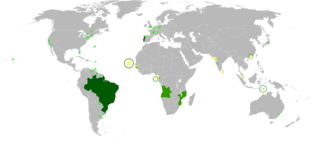
Santana (meaning Saint Anne in Portuguese) is a neighbourhood in the city of Porto Alegre, the state capital of Rio Grande do Sul, Brazil. It was created by Law 2022 from December 7, 1959.

According to apocryphal Christian and Islamic tradition, Saint Anne, of David's house and line, was the mother of Mary and grandmother of Jesus. Mary's mother is not named in the canonical gospels, but is mentioned as the daughter of Faqud in Quran. In writing, Anne's name and that of her husband Joachim come only from New Testament apocrypha, of which the Gospel of James seems to be the earliest that mentions them.

Portuguese is a Western Romance language originating in the Iberian Peninsula. It is the sole official language of Portugal, Brazil, Cape Verde, Guinea-Bissau, Mozambique, Angola, and São Tomé and Príncipe. It also has co-official language status in East Timor, Equatorial Guinea and Macau in China. As the result of expansion during colonial times, a cultural presence of Portuguese and Portuguese creole speakers are also found in Goa, Daman and Diu in India; in Batticaloa on the east coast of Sri Lanka; in the Indonesian island of Flores; in the Malacca state of Malaysia; and the ABC islands in the Caribbean where Papiamento is spoken, while Cape Verdean Creole is the most widely spoken Portuguese-based Creole. A Portuguese-speaking person or nation may be referred to as "Lusophone" in both English and Portuguese.

A neighbourhood, or neighborhood, is a geographically localised community within a larger city, town, suburb or rural area. Neighbourhoods are often social communities with considerable face-to-face interaction among members. Researchers have not agreed on an exact definition, but the following may serve as a starting point: "Neighbourhood is generally defined spatially as a specific geographic area and functionally as a set of social networks. Neighbourhoods, then, are the spatial units in which face-to-face social interactions occur—the personal settings and situations where residents seek to realise common values, socialise youth, and maintain effective social control."
 | This geographical article relating to Rio Grande do Sul is a stub. You can help Wikipedia by expanding it. |
